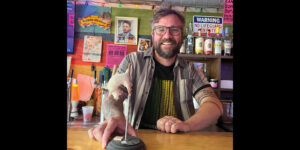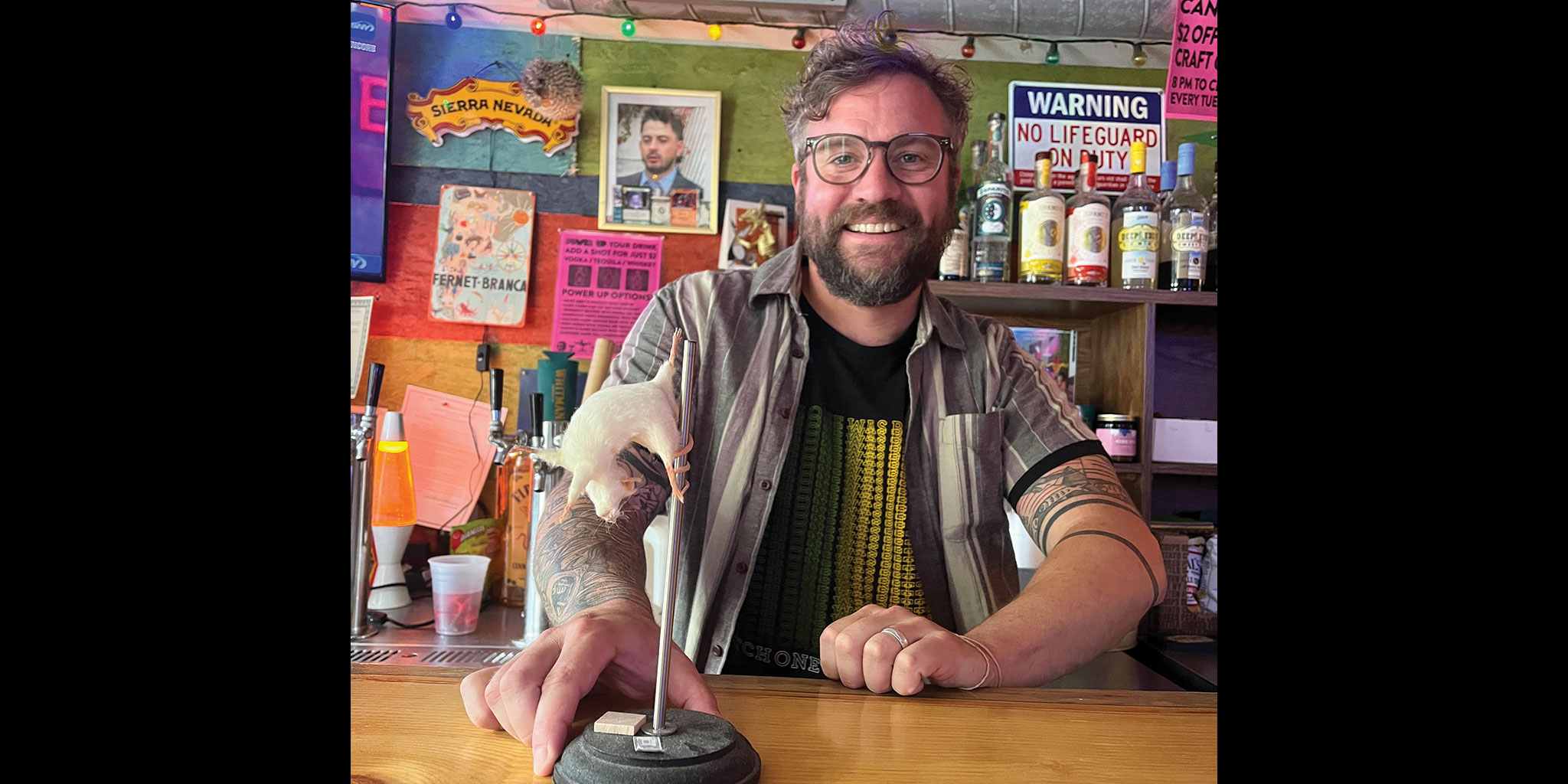If you practice yoga, you’re in on the secret: It’s really, really difficult to do well, but it’s great for the body and soul. And it runs deeper than just pure athleticism. Yoga is about balance and betterment, concentration and composure, steadiness and stability, meditation and mindfulness—concepts that you don’t normally have to reckon with when you’re pumping iron. Paradoxically, yoga is also very much about what’s not there. Because of yoga’s meditative component, a lot of what you’re doing while you’re in the various yoga poses—downward facing dog, puppy, pigeon, lizard, eagle—is clearing your mind of anything that doesn’t serve you. In other words, you’re actively being inactive. You’re letting go. You’re just being.
In late July of last year, Judy Joy Wyle, who had run Saratoga Springs’ longest dedicated yoga studio, the Joy of Yoga, found herself in the womb-like basement of the Arcade building on Broadway, her business’ home for more than two decades, clearing out the space, with the help of her boyfriend, amidst ghostly silence. The subterranean space was a bit of an anomaly in town, one devoid of the usual sounds of the hustle and bustle of the city, the honking horns and chit-chatty pedestrians shouldering towards their final destination. That ambient noise had lessened considerably, too, since mid-March, when New York Governor Andrew Cuomo had shut down the state due to the COVID-19 pandemic. Though many storefronts and boutiques and restaurants had reopened by July, the foot traffic along Broadway wasn’t quite as frenetic as in years past.
Wyle and her boyfriend had chosen to make their final trip to the space on a Sunday. “The way I dismantled [the space] was in a very premeditated way,” says Wyle. “I cleaned the closets, with the help of my boyfriend. It took three long weekends. I took all this stuff down from the walls. That was the very last thing I did. I had a huge butterfly that a friend of mine had painted [on the wall] that you saw as soon as you walked into the studio—it took up a whole wall—and that was the last thing I took down,” she says, her voice cracking. She begins to cry. “It really is emotional for me to think about it.” By the time the long, sad process had come to a conclusion, it was 10pm, long after the crowds of day-trippers would’ve dispersed anyway. Wyle and her boyfriend then closed the door for the final time and walked out into the parking lot behind the building. A large, full moon, which Wyle says is a symbol of completion, was shining down on them. And they noticed the strangest thing. “There were people moving into the building at that late hour into a barbershop,” says Wyle. “And we were out there chatting with them.” It was as if they were taking her place. She felt like she was part of a “disappearing act.”
Wyle describes her Broadway studio as not just a traditional place of business. “It was a home to all my students and was an extension of my home,” she explains. “It was like my big living room, because where I’ve lived for 37 years, is a very small apartment with a very small living room.” Wyle’s decision to close her business wasn’t one that she made overnight; at the beginning of July, three months and change into the pandemic and teaching virtual yoga classes, Wyle polled her students, many of whom had been loyal customers for years, asking them when they imagined they’d be comfortable coming back to a physical space again to do yoga. With the exception of maybe one student, says Wyle, none of her students could say for certain, and that’s when she knew that, despite her landlord’s kindness and flexibility in the matter, she would need to close for good. “My students knew I was closing,” Wyle says, “but I never went public about it.”
Yoga hadn’t been some passing phase for Wyle. She had discovered it at the age of 19, while living in New York City and pursuing a career as a singer-songwriter in the late ’60s. And she became a dedicated devotee of the practice. “What really got me attracted to Eastern culture was reading Siddhartha by Hermann Hesse,” she says. “It brought me into metaphysics, which was just a natural place for me to go, and I’ve been involved in and reading and studying metaphysics for my entire life.” In 1983, Wyle moved to Saratoga, finishing a theater degree at Skidmore College and becoming a regular in the downtown music scene (she was also a founding member of the Home Made Theater). Six years later, “a light bulb went off, and I knew that yoga really was my calling,” she says. So she traveled to the Kripalu Center for Yoga & Health in Stockbridge, MA, where she did a monthlong training session. “In those days, when you went to train, you lived there,” she says. “It wasn’t a weekend [getaway]; it was very concentrated and in-depth training. Being there was such a deepening in my understanding of yoga. It’s taken me all this way.”
Soon after completing her coursework at Kripalu, Wyle founded the Joy of Yoga, at the time sharing a space with an aerobics studio called Fit as a Fiddle on Spring Street. “I think that yoga was thought of as kind of cult-y back then,” says Wyle, who eventually brought in a steady stream of students.
The type of yoga Wyle learned at Kripalu and now teaches is called “hatha” yoga, the most widely practiced type in the US, which has breath as its centerpiece. “Whenever we’re breathing mindfully, it organically brings us into a place of meditation, because what we’re doing, in mindful breathing, is circulating light, life and love,” she says. “Hatha yoga was created to prepare the body to sit still and meditate, because a body that’s all uncomfortable and can’t settle down, can’t meditate.”
The night Wyle packed up her Broadway yoga space, she says that, in a fit of inspiration, she sat down and wrote a lengthy piece about what she was feeling at the time. “I realized that night that I had to speak about this, because there’s a grieving process here that I have been in, and I wanted it to be known. [The Joy of Yoga] was a thriving business in Saratoga, physically,” she says. “I taught thousands and thousands of students.” That, and she’s been getting the occasional message from past students saying they’re looking forward to when she’ll be able to reopen, and of course, she won’t be.
While her physical Broadway space is gone, Wyle has been teaching yoga classes virtually out of her own living room since mid-March. “For all of us, there’s just a dystopian surreal-ness in it,” she says. While teaching yoga on Zoom is certainly not the same as breathing and sweating with students in the same room, it’s almost as though cyberspace has turned her tiny living room into the world’s largest yoga studio, one in which an infinite number of bodies could fit. At least, that’s what comes to my mind as I’m thinking out loud during my conversation with Wyle, which ran about an hour long and was much less of an “interview” than two people talking about life. “I’ve never thought of it that way,” says Wyle. “It’s kind of cosmic, isn’t it? It is amazing, over the course of the class, how unified the feeling [becomes]. It becomes a satsang, or ‘gathering in the name of truth,’ which I think is what every yoga class is or is meant to be: the truth of being present to our aliveness. Over the course of a yoga class, it’s amazing to me that I can feel it through the airwaves when we get to the end of a class. We have become unified and interconnected in this deep, harmonizing presence. Even in this new way of being together, it still happens.”
While teaching virtual classes is certainly not what Wyle ever thought she would be doing right now, she says she still dreams of someday reopening her studio in Saratoga. And maybe, whenever that time is, she’ll teach both physical and virtual classes. “At this point in my life, I’ve thought, ‘Has this ship sailed?’ and the answer that has come to me quite clearly is I want and need to teach yoga for as long as I can. I do see that happening, and I do trust that it will happen.”















